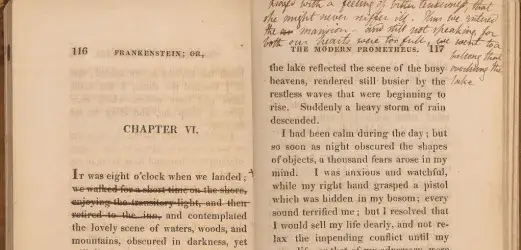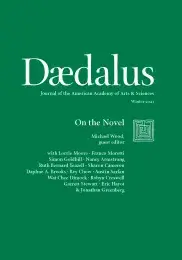
Finding the Time for Ancient Novels
This essay looks at the history of the novel, starting from the influential postwar critical insistence on the importance of the novel as a nineteenth-century genre. It notes that this tradition singularly fails to take account of the history of the novel in antiquity–for clear ideological reasons. It then explores the degree to which the texts known as the novel from antiquity, such as Longus’s Daphnis and Chloe, Petronius’s Satyricon, or Heliodorus’s Aethiopica, constitute a genre. Although there is a great deal of porousness between different forms of prose in antiquity, the essay concludes by exploring why the ancient novel, ignored by critics for so long, has now become such a hot topic. It argues that much as the postwar critics could not fit the ancient novel into their histories, now the ancient novel’s interests in sophisticated erotics, narrative flair, and cultural hybridity seem all too timely.
Some Endangered Feeling
This essay sees the recent trend in novels that feature damaged, partial, or wayward protagonists as the ascent of a tradition of formal outliers as old as the novel itself to a position of dominance. Rather than formulate a self-contained individual capable of defending itself against whatever forces of nature or society might disperse and refigure it, this other tradition gave into those forces, releasing human subjectivity from the confines of the self-regulating individual. Why now? How does this major turn in the history of the novel contribute to the current reconsideration of human motivation and behavior in light of affect theory? If Robinson Crusoe provided a bellwether for the individual to come, then what can the damaged protagonist of Tom McCarthy’s 2005 novel Remainder tell us about the selves we are likely to become?
Henry James in—and out of—the Classroom
Henry James did not write for the classroom. His personal experience of the institution was erratic at best, and most of his work was published at a time when the novel had yet to be formally recognized as a subject of academic study. But he believed strongly that “art lives upon discussion,” and the undergraduate classroom can be an invigorating space in which to keep that discussion going. Drawing both on my own experience of teaching James’s novels over the years and on an informal survey of Yale undergraduates who have studied the novelist with me in recent decades, this essay addresses some of the ways in which his work continues to resonate both in and out of the classroom.
The Hole in the Carpet: Henry James’s The Bostonians
“The Hole in the Carpet” examines the ways in which Henry James deflates and nullifies value in The Bostonians. The essay raises a question of whether a novel that has no stable repository for value creates in its stead an ethical vacuum that is costly for a reader.
“A Woman Is a Sometime Thing”: (Re)Covering Black Womanhood in Porgy and Bess
This essay reexamines the legendary opera-musical Porgy and Bess by first tending to its origins in the dual phenomenon of early 1920s racialized sonic experimentation and the Southern literary conceits of DuBose Heyward, author of the 1925 novel Porgy on which the theater production was based. It traces the ways in which Heyward and George Gershwin’s undertheorized fascination with “the vice of Black womanhood” effectively shaped the form and the content of a work often referred to as “America’s most famous opera,” and it ultimately considers the ways that Black women artists navigated, complicated, and transformed the charged aesthetics of a Porgy and Bess. Their performance labor ultimately subverts an archetype whose novel roots threatened to circumscribe their representational and artistic possibility.
We “Other Victorians”? Novelistic Remains, Therapeutic Devices, Contemporary Televisual Dramas
In reference to the work of Michel Foucault and to residual Victorian novelistic features, this essay explores the biopolitical dimension of contemporary televisual dramas, focusing on the popular crime genre as seen in The Sopranos (1999–2007), Breaking Bad (2008–2013), and The Fall (2013–2016). Emphasizing the confessional context of criminality and policing, we demonstrate how such shows rely on the conventions of modern psychological discourse in depicting criminals, thus foregrounding what Eva Illouz in Saving the Modern Soul (2008) has called the “therapeutic emotional style.” By updating aspects of D. A. Miller’s conception of the policing plot in The Novel and the Police (1988), we argue that confession in contemporary televisual dramas exemplifies a cultural transition from power as force to power as communication. The ascendance of communicative power pathologizes aspects of masculinity and introduces a new dramatic/narrative device: the therapeutic couplet.
The Survival of the Unfit
Is there room for weaklings in Darwin’s theory of evolution? The “survival of the fittest”—that muscular phrase taken from Herbert Spencer—would seem to suggest not. A more nuanced and counterintuitive picture emerges, however, when fitness is remapped: as a form of mutuality between the human and the nonhuman, rather than an exclusively human attribute vested in a single individual. I explore that possibility in the contemporary novel, a genre evolving steadily away from its Victorian antecedent, and circling back to the epic to reclaim an elemental realism, alert to the reparative as well as destructive forces of the nonhuman world. In Barbara Kingsolver’s The Poisonwood Bible and Richard Powers’s The Overstory, these nonhuman forces turn the novel into a shelter for disabled characters, granting them a testing ground and a future all the more vital for being uncertain.
Poets in Prose: Genre & History in the Arabic Novel
Novelists in many literary traditions have come to terms with the distinctiveness of their art form by thinking about poets and poetry. The need to differentiate the novel from poetry is especially pressing for Arab prose writers because of poetry’s preeminent status in that literary corpus. Many twentieth-century Arab intellectuals have valorized the novel as the representative genre of modernity—whether conceived as an absent ideal or the epoch of consumerist capitalism—while situating poetry as a backward element of contemporary life. But poetry has also offered prose writers such as Muhammad al-Muwaylihi, in A Period of Time, and novelists such as Tayeb Salih, in Season of Migration to the North, a way to reflect on the ambivalences engendered by modernity and the experience of colonialism. This tradition of using the novel to meditate on historical rupture and the fate of poetry continues into the present, even as poetry’s relation to political and intellectual life becomes increasingly tenuous.
Organic Reformations in Richard Powers’s The Overstory
Richard Powers takes the literary concept of “organic form” to new exploratory lengths—and satellite heights—in his latest ecofiction. In particular, the novelist who has proselytized voice-recognition software for the dictation of novelistic prose offers with that advice an unexpected leverage on the structuring “understory” (the botanical term) for his Pulitzer Prize–winning novel The Overstory (2018). In both textual phonetics and mapped thematic links, marked patterns of recurrence are to prose, here as elsewhere, what rhyme and meter are to poetry. In a novel that seeks to attune us to the secret “semaphores” of forest life, such elicited traces of nonhuman signaling articulate a vital terrestrial network evoked through a scale of decoded pattern that, in developing its own stylistic echosystem, answers to the environing field of narrative action, and forest activism, across eight different biographical plotlines in the novel’s convergent cast of characters.
Video Games & the Novel
In the last sixty years, the video game industry has grown from quite literally nothing to a behemoth larger than the film or television industries. This enormous change in the shape of cultural production has failed to make much of an impact on the study of culture more generally, partly because video games seem so much less culturally important than novels. No one has ever imagined the Great American Video Game. But video games have more in common with novels than you might think, and vice versa. Anyone trying to understand the combination of neoliberal individualism and righteous murderousness that characterizes our world today will do well to pay them some attention.
Losing Track of Time
Ottessa Moshfegh’s My Year of Rest and Relaxation tells a story of doing nothing; it is an antinovel whose heroine attempts to sleep for a year in order to lose track of time. This desire to lose track of time constitutes a refusal of plot, a satiric and passive-aggressive rejection of the kinds of narrative sequences that novels typically employ but that, Moshfegh implies, offer nothing but accommodation to an unhealthy late capitalist society. Yet the effort to stifle plot is revealed, paradoxically, as an ambition to be achieved through plot, and so in resisting what novels do, My Year of Rest and Relaxation ends up showing us what novels do. Being an antinovel turns out to be just another way of being a novel; in seeking to lose track of time, the novel attunes us to our being in time.
